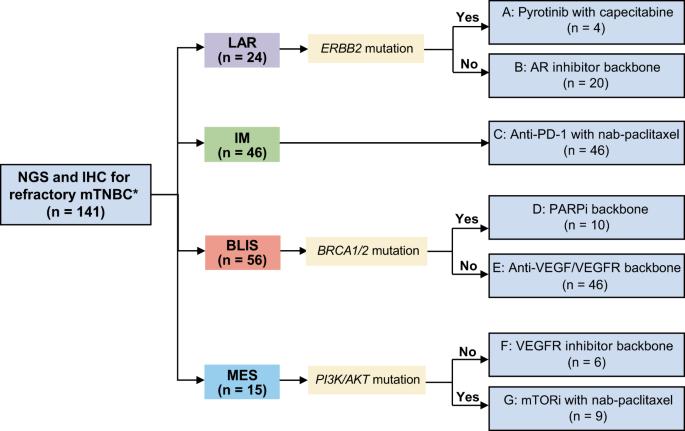Subtyping-based platform guides precision medicine for heavily pretreated metastatic triple-negative breast cancer: The FUTURE phase II umbrella clinical trial
IF 28.1
1区 生物学
Q1 CELL BIOLOGY
引用次数: 2
Abstract
Triple-negative breast cancer (TNBC) is a heterogeneous disease and lacks effective treatment. Our previous study classified TNBCs into four subtypes with putative therapeutic targets. Here, we report the final results of FUTURE, a phase II umbrella trial designed to explore whether the subtyping-based strategy may improve the outcomes in metastatic TNBC patients. A total of 141 patients with a median of three previous lines of therapies in the metastatic setting were enrolled in seven parallel arms. Confirmed objective responses were achieved in 42 patients (29.8%; 95% confidence interval [CI], 22.4–38.1). The median values of progression-free survival and overall survival were 3.4 (95% CI: 2.7–4.2) and 10.7 (95% CI: 9.1–12.3) months, respectively. Given Bayesian predictive probability, efficacy boundaries were achieved in four arms. Furthermore, integrated genomic and clinicopathological profiling illustrated associations of clinical and genomic parameters with treatment efficacy, and the efficacy of novel antibody–drug conjugates was explored in preclinical TNBC models of subtypes for which treatment was futile. In general, the FUTURE strategy recruits patients efficiently and provides promising efficacy with manageable toxicities, outlining a direction for further clinical exploration.

基于亚型分析的平台为重度预处理转移性三阴性乳腺癌的精准医疗提供指导:FUTURE II 期总体临床试验
三阴性乳腺癌(TNBC)是一种异质性疾病,缺乏有效的治疗方法。我们之前的研究将 TNBC 划分为四种亚型,并提出了相应的治疗靶点。在此,我们报告了FUTURE的最终结果,这是一项II期伞形试验,旨在探索基于亚型的策略是否能改善转移性TNBC患者的预后。共有 141 名既往接受过中位数三线治疗的转移性 TNBC 患者参加了七组平行试验。42名患者(29.8%;95% 置信区间 [CI],22.4-38.1)获得了确诊的客观反应。无进展生存期和总生存期的中位值分别为 3.4 个月(95% CI:2.7-4.2)和 10.7 个月(95% CI:9.1-12.3)。考虑到贝叶斯预测概率,四个研究臂均达到了疗效界限。此外,基因组和临床病理学综合分析表明了临床和基因组参数与疗效之间的关联,并在治疗无效的亚型 TNBC 临床前模型中探索了新型抗体药物共轭物的疗效。总体而言,FUTURE 策略招募患者的效率很高,疗效良好,毒性可控,为进一步的临床探索指明了方向。
本文章由计算机程序翻译,如有差异,请以英文原文为准。
求助全文
约1分钟内获得全文
求助全文
来源期刊

Cell Research
生物-细胞生物学
CiteScore
53.90
自引率
0.70%
发文量
2420
审稿时长
2.3 months
期刊介绍:
Cell Research (CR) is an international journal published by Springer Nature in partnership with the Center for Excellence in Molecular Cell Science, Chinese Academy of Sciences (CAS). It focuses on publishing original research articles and reviews in various areas of life sciences, particularly those related to molecular and cell biology. The journal covers a broad range of topics including cell growth, differentiation, and apoptosis; signal transduction; stem cell biology and development; chromatin, epigenetics, and transcription; RNA biology; structural and molecular biology; cancer biology and metabolism; immunity and molecular pathogenesis; molecular and cellular neuroscience; plant molecular and cell biology; and omics, system biology, and synthetic biology. CR is recognized as China's best international journal in life sciences and is part of Springer Nature's prestigious family of Molecular Cell Biology journals.
 求助内容:
求助内容: 应助结果提醒方式:
应助结果提醒方式:


